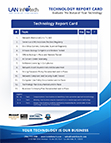According to the World Health Organization, cyber-attacks have increased fivefold since the beginning of the Coronavirus pandemic. These attacks have been directed to not only the WHO staff but the public as well. In the period between April 19th and 25th, more than 450 World Health Organization email addresses, along with passwords were leaked online. And the fact that the dependence on digital systems and tools has massively increased during this pandemic, the risk of cyberattacks is much more significant.
Because of this threat, The U.S. and the U.K. top cyber agencies issued a joint alert stating that hackers and spies are exploiting the COVID 19 pandemic to compromise the systems used by individuals and organizations for remote work. The warning states explicitly that hackers and scammers are launching numerous fraud schemes, as well as phishing frauds to leverage the tension and emotions brought about by the pandemic. Because of this, cybersecurity matters now than ever. If you’re a remote worker or an organization that stores sensitive data, here are tips to keep hackers and spies at bay during this COVID 19 pandemic.
Draw up a detailed guideline for protection against cyber attacks
If you’re an organization, come up with a detailed guideline to help your staff protect your systems against individually targeted phishing frauds. The guideline should include technical measures that prevent such emails from reaching remote users.
Avoid clicking on every email attachment
Emails are one of the primary sources of cyber attacks. The risk of email cyber attacks is much more significant during the COVID 19 pandemic. Therefore, ensure triple-check the authenticity of every email you receive before you click on the attachment.
Fortify the security of your systems
If you’ve never thought about fortifying the security of your systems, this COVID 19 pandemic period is the right time to do it. If you are an organization, direct your IT team to install endpoint detection and response solutions that allow rapid, automated detection and response to any cyber attack. For example, ensure to install a firewall on your computer. A firewall prevents unauthorized access to your private network or from your private network. In other words, it prevents unauthorized internet users from accessing the network (your private network) connected to your system. Without a firewall, hackers can access your private network, breach your systems, and steal your private data. Also, ensure to install a reliable antivirus on your computer. An antivirus can prevent, detect, and rid your system of malware, such as viruses, botnets, Trojans, and ransomware that are known to aid cyber attacks.
Use a two-step authentication process
A common type of cyber attack during the COVID 19 pandemic is an authentication breach. To prevent hackers and spies from breaching your systems, deploy a two-step authentication process. For example, set an authentication whereby, after entering your password, the system takes you to a second authentication step where you can enter your phone number to be able to access your files or accounts. SMS-based authentication is the most common type of two-step authentication process. How does it work? After entering your secret password, the system automatically sends you an SMS with a code. You’ll then need to enter the code in the provided box to access your network, file, or account.
Restrict your systems’ access to websites without a valid SSL Certificate
SSL stands for secure socket layer. An SSL certificate means a website is safe to use. How do you tell if a website has an SSL certificate? If it has a locked, green padlock next to its web address, then it has an SSL certificate.
Also, restrict your systems to websites without ‘S’’ at the end of the initials HTTP. Secure websites must read like this; https. The ‘’S’’ stands for security. Therefore, websites without the ‘’S’’ are not safe to visit, and you must restrict your systems to them.
The World Health Organization, as well as U.S. and U.K. cybersecurity agencies, urge individuals to be vigilant during the COVID 19 pandemic. That’s because hackers and spies know that the majority of people are working from home using their systems, and most don’t bother about the security of those systems. Implementing the tips, as mentioned above, will insulate you from cyber-attacks perpetrated by hackers.

LAN Infotech is a Microsoft Cloud Services Provider, IT Managed Support company and a leader in helping law firms, nonprofits and medical organizations deploy cloud solutions, manage computer networks, keep data protected and top technology management company. Businesses like yours need technology support to run highly-effective organizations.



